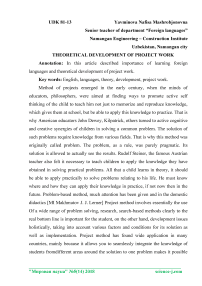Theoretical development of project work
Автор: Yavminova N.M.
Журнал: Мировая наука @science-j
Рубрика: Основной раздел
Статья в выпуске: 5 (14), 2018 года.
Бесплатный доступ
In this article described importance of learning foreign languages and theoretical development of project work.
English, languages, theory, development, project work
Короткий адрес: https://sciup.org/140263504
IDR: 140263504
Текст научной статьи Theoretical development of project work
Method of projects emerged in the early century, when the minds of educators, philosophers, were aimed at finding ways to promote active self thinking of the child to teach him not just to memorize and reproduce knowledge, which gives them at school, but be able to apply this knowledge to practice. That is why American educators John Dewey, Kilpatrick, others turned to active cognitive and creative synergies of children in solving a common problem. The solution of such problems require knowledge from various fields. That is why this method was originally called problem. The problem, as a rule, was purely pragmatic. Its solution is allowed to actually see the results. Rudolf Steiner, the famous Austrian teacher also felt it necessary to teach children to apply the knowledge they have obtained in solving practical problems. All that a child learns in theory, it should be able to apply practically to solve problems relating to his life. He must know where and how they can apply their knowledge in practice, if not now then in the future. Problem-based method, much attention has been given and in the domestic didactics [MI Makhmutov J. J. Lerner] Project method involves essentially the use Of a wide range of problem solving, research, search-based methods clearly to the real bottom line is important for the student, on the other hand, development issues holistically, taking into account various factors and conditions for its solution as well as implementation. Project method has found wide application in many countries, mainly because it allows you to seamlessly integrate the knowledge of students fromdifferent areas around the solution to one problem makes it possible to apply this knowledge in practice, generating new ideas, collecting new information at the same time.
Project method has attracted the attention of Russian teachers in the early 20th century. The idea of project-based learning originated in Russia is almost parallel with the development of American educators. Under the guidance of the Russian teacher S.T. Shatskogo in 1905 was organized by a small team, trying to usethe designmethods in the practice of teaching. Later, during the Soviet era, these ideas have become quite widely introduced in the school, but not coherent, and the decision of the CC in 1931, the project method was tried and since then until recently in Russia is no longer undertaken any serious attempts to revive this method in school practice. However, in a foreign school, he actively and successfully developed. In the U.S., Britain, Belgium, Israel, Finland, Germany, Italy, Brazil, the Netherlands and many other countries where the idea of a humanistic approach to education J.Dyu, his method of project found a wide spread and gained popularity by virtue of a rational combination of theoretical knowledge and their practical application to solve specific problems of reality in a joint activity of schoolchildren.
First and foremost, we emphasize once more the idea that we teach the methods of activity, speech activity. Therefore, we are talking about the communicative competence as a major goal of foreign language teaching. Of course, we realize that communicative competence can be formed only on the basis of the linguistic competence of a certain level. However, the purpose of instruction in all types of schools is not a system of language and foreign language speaking activity.
The project was conducted in the 1996-1997 academic year between the schools of Downers Grove (USA) and CRM 326, Moscow (Russia). Project Coordinators Bukharkina MY and Jim Doddrazrabotali stages and its methodology. The projectwas conceived for the Russian side in the subject offoreign language", but provided some knowledge of history, social science, For American students the project was conceived as a project on civic education with skills in writing essays, reports in their native language. In other words, the type of project - research, with an information module, the interdisciplinary, international telecommunications.
So far we have mentioned the effectiveness of project in ESP classes and why we and above mentioned authors consider projects effective in teaching English because project is new way of working and creating friendly atmosphere between student and teacher or student and student. The project work should not be seen only as a different way of language teaching. It includes a full range of skills, which should be naturally integrated and used in balance. Besides the social skills and learners' independence mentioned above, project work includes the development of the motor skills such as coloring, painting, gluing or cutting, and of course of the intellectual skills like planning, using imagination or describing [Phillips, Burwood, Dunford, p. 6]. Moreover, all four language skills (i.e. reading, listening, speaking and writing) are needed in combination during the work. Fried-Booth observes: "Different projects, of course, require different procedures. And so different skills will come into prominence at different stages" [Fried-Booth, p. 81. It is probable that the initial stages of the project may imply mainly the speaking skills, for instance in discussions about the topic. However, writing, listening and reading will also be used during the work [Fried-Booth, p. 9]. At the same time project work provides learners with digital age skills such as teamwork, problem solving, research gathering, time management, information synthesizing, utilizing high tech tools. With this combination of skills students become directors and managers of their learning process.
Список литературы Theoretical development of project work
- Jane Willis. A Framework for Tasked-Based Learning. London: Longman.1996
- Jane Wills. Task-based Language Teaching: teachers‘ solutions to problems. 2000
- Harmer, Jeremy. The Practice of English Language Teaching. Harlow: Longman. 2001.


